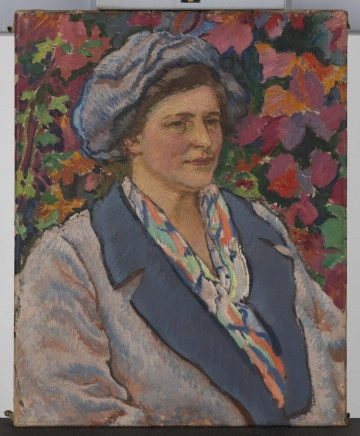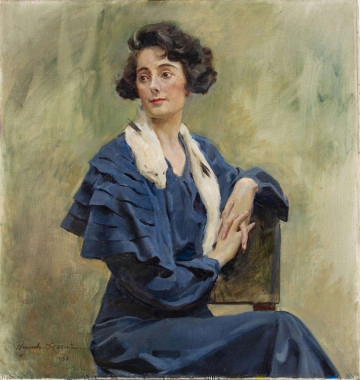
Portrait of the wife
National Museum in Lublin
Part of the collection: Portrait
Historical and patriotic themes dominate the work of Artur Grottger. In the common perception, the artist's name is most often associated with a few scenes: Kucie kos [Forging of the Scythe], Bitwa [Battle], Znak [Sign]. They come from the famous drawing cycles devoted to the January Uprising entitled ‘Polonia’ and ‘Lituania’. Both collections gained incredible popularity during the artist's lifetime as symbols of the nation's responsible attitude and aspirations for freedom. To this day, they have retained their special significance and position in the canon of images associated with national martyrdom.
An integral part of Grottger's portrait creation remains in the shadow of the primary trend. The artist left many images. He created them during his short life, and he lived only 30 years. Most of them were created after his return to the country from Vienna (1865-1867), where he stayed on an imperial scholarship, withdrawn from him to support the Uprising.
Grottger's portrait painting is characterised by considerable diversity due to the way the figures are presented. Apart from representative portraits, there are in-depth studies of relatives and friends, lyrical female, casual, slightly exaggerated peasant types and a separate group of characteristic self-portraits. Portret młodej dziewczyny [Portrait of a Young Girl] is an example of sentimental images of women. It repeats the artist's traditional depiction of models by showing the figure's head or bust alone, in front or en trois quarts. We do not know the name of the girl painted. We certainly know that she was a young Polish patriot. Her patriotic attitude is evidenced by her plain, black dress and modest hairstyle, all of which, taken together, constituted an expression of national mourning and resistance to the partitioners' brutal actions at the time of the Uprising. The custom of wearing black clothes with unique mourning jewellery started after the Warsaw massacre on 27 February 1861. It continued for the next five years despite bans and severe restrictions imposed by the partitioners, especially the Russian administration. The end of national mourning came officially in 1866 when the Tsar announced an amnesty. However, many women of that era did not exchange black for colourful dresses, expressing their sadness and longing for a free homeland. In this context, Portrait of a Young Girl is an eloquent testimony of that time.
Bożena Kasperowicz
Author / creator
Dimensions
cały obiekt: height: 25 cm, width: 26,5 cm
Object type
painting
Technique
oil technique
Material
canvas, oil-based paint
Creation time / dating
Creation / finding place
Owner
The National Museum in Lublin
Identification number
Location / status

National Museum in Lublin

around 1908
National Museum in Lublin

1933
National Museum in Lublin
DISCOVER this TOPIC
Museum of King Jan III's Palace at Wilanów
DISCOVER this PATH
Educational path